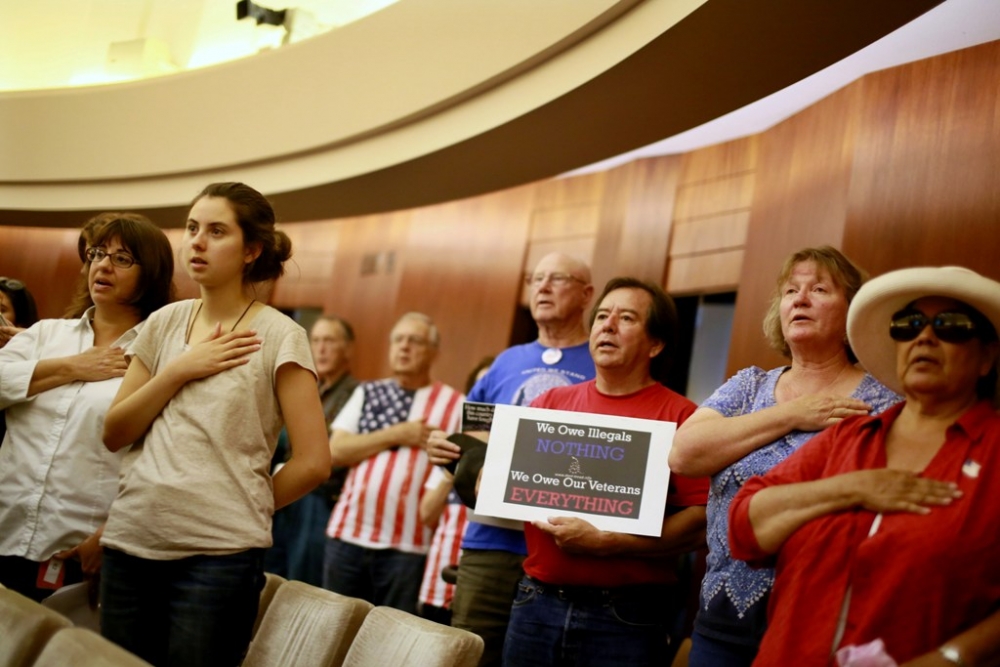A secular organization has released a poll which states that over a third of Americans support removing the phrase “Under God” from the Pledge of Allegiance.
The American Humanist Association released on Tuesday a study done for their organization by The Seidewitz Group indicating that 34 percent of Americans support removing the phrase.
Roy Speckhardt, executive director for the American Humanist Association, told The Christian Post that the poll was done, in part, as a counter to a LifeWay Research Poll from last year.
Free Sign Up CP Newsletter!
Related
Massachusetts High Court Upholds ‘Under God’ in Pledge of Allegiance as Constitutional
Secular Group Files Lawsuit in New Jersey Against ‘Under God’ in Pledge
Wis. High School Accused of Replacing ‘God’ in Pledge of Allegiance With ‘Peace’
Mich. Lawmaker Fights to Keep ‘Under God’ in Pledge of Allegiance Forever
‘Under God’ Likely to Remain in Pledge Despite New Atheist Challenge, Attorney Says
Speckhardt also told CP that he believes the unusually high percentage of individuals supporting the removal of the phrase was due to the study providing background on the pledge’s history.
“The numbers in support of retaining ‘under God’ that they were getting didn’t line up with what we were seeing in towns and cities across the country,” said Speckhardt.
“We thought it possible that the increased support for returning the pledge to its pre-Mcarthy Era form, might be higher if people learned about the origins of the 1953 addition of “under God” to the pledge. This survey showed the truth in that hypothesis.”
The AHA study was a six-question survey found online that was conducted on May 29 and had a sample space of 1,000 American adults.
For their questionnaire, the group told the survey takers that the phrase “under God” was absent from the Pledge of Allegiance up until the 1950s.
“During the Cold War, in 1954, the phrase ‘one nation indivisible’ was changed to read ‘one nation, under God, indivisible.’ Some people feel this phrase in our national pledge should focus on unity rather than religion,” read the information given to respondents.
The study’s findings noted that 21.4 percent of Christian respondents, 40.9 percent of respondents professing different faiths, and 62.7 percent of those professing no religious affiliation supported removal.
In April, LifeWay Research released the findings of a poll they conducted last September on what Americans felt about the phrase “under God” being in the Pledge of Allegiance.
For the LifeWay poll, 85 percent of respondents wanted “under God” to remain in the Pledge, 8 percent said it should be removed, and 6 percent said they did not know.
LifeWay’s sample space was 1,001 adults, who they interviewed over the telephone during a four-day period in September of last year.
“Most Americans have recited the pledge hundreds of times and are not inclined to memorize a different pledge,” said Scott McConnell, director of LifeWay Research, back in April.
“Changing it may just feel wrong. Most Americans say they believe in God or a higher being and feel comfortable having ‘under God’ in the pledge.”
From when it was first proposed in the 1950s, various polls on the position of “under God” in the pledge have produced supermajorities in favor of the phrase.
In 1953, a Gallup Poll found that 69 percent of Americans surveyed supported adding the phrase, 21 percent were opposed, and 10 percent held no opinion.
In 2002, an ABC News.com/Washington Post poll conducted via telephone of 1,024 adults nationwide, found that 89 percent of Americans felt the phrase should remain in the pledge.
They conducted the poll in response to a three-judge panel of the Ninth Circuit Court of Appeals ruling against the phrase earlier that year.
“The Ninth Circuit may differ, but an overwhelming majority of Americans pledge allegiance to the pledge,” reported Dalia Sussman of ABC News back in 2002.
“George W. Bush called the ruling ‘ridiculous’ and both houses of Congress passed resolutions condemning it.”
The American Humanist Association has stated that the poll has encouraged them to begin a “new campaign” on the topic beginning next Monday.
Speckhardt of AHA declined to give details to CP about what this “new campaign” will specifically do, but he did acknowledge that AHA is overseeing a lawsuit against the phrase in New Jersey.
Original Photo by Christian Post



